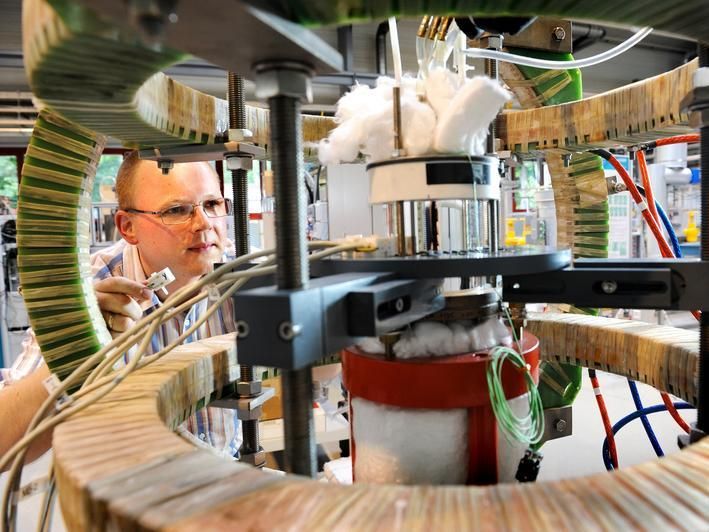Smart tomographic sensors control industrial processes of tomorrow
HZDR coordinates European Doctoral Training Network TOMOCON
Modern parallel computer architectures are capable of processing huge amounts of data at high speed. This allows for the increasing use of imaging techniques as sensors to control machines and process plants. In the new European collaborative project TOMOCON twelve research institutions and 15 renowned industrial companies work together on the development of imaging-based industrial process control. The network is coordinated by the Helmholtz-Zentrum Dresden-Rossendorf (HZDR).

Magnetic tomography developed at HZDR is an important prerequisite for controlling mold injection in continuous steel casting.
HZDR / F. Bierstedt
Beginning of September, the European Doctoral Training Network „Smart Tomographic Sensors for Advanced Industrial Process Control“ (TOMOCON) is going to be launched. “Together with our international partners we offer a comprehensive doctoral training to 15 Early Stage Researchers. Beside their academic research projects they will receive industrial training in various companies and attend three summer schools of the network“, explains the project coordinator Professor Uwe Hampel from HZDR.
The scientific subject of the network is a hot topic within the context of digitalized industrial processes. Especially with the development of ultrafast parallel-data processing techniques imaging technologies have gained an enormous potential to be employed as sensors for real-time control of industrial processes and plants. Such concepts currently emerge in other fields as well, such as for example in autonomous driving.
Among the many imaging techniques tomographic ones are of highest interest for the industry, as they can provide insight into opaque systems in a contactless way. However, to do so it is imperative to solve some grand challenges coming from industrial processes. Just to name a few: How can we cope with aggressive process conditions and highest data rates? How can control parameters be most intelligently and rapidly extracted from image data? What does human-machine interaction in such systems look like? Hence, the research topics of the 15 Early Stage Researchers are accordingly diverse and connect the scientific fields of sensor technology, process tomography, industrial process control, computational physics and process modelling, human-machine interaction and massive parallel-data processing.
Efficient industrial processes of the future
The TOMOCON project attains a strong practical relevance through four selected technical demonstrations, which are closely accompanied by the many industry partners. In inline-fluid separation liquids of different density are being separated via centrifugation in slim flow channels. Process control with smart tomographic sensors shall suppress the development of emulsions and hence improve the separation quality drastically. This is of vital interest in the chemical and petro-chemical industry and supported by companies like Linde, Shell and TOTAL. Magnetic tomography developed at HZDR shall be developed as a sensor for controlling mold injection in continuous steel casting at highest production speed and will be accompanied by the Austrian company Primetals Technologies and the Dutch TATA Steel. Together with the German companies Vötsch Industrietechnik and Pinta Elements the drying of impregnated polymer foams via tomography-controlled microwave heating will be demonstrated. Furthermore TOMOCON will demonstrate ultrasound-controlled industrial crystallization together with Sulzer Switzerland and DuPont from Finland.
“At HZDR we are strongly involved in the first two topics,” says Uwe Hampel, who is also Endowed Chair of Imaging Techniques in Energy and Process Engineering at TU Dresden. “We are proud that our project also contributes to a sustainable network of academic and industrial partners in Europe and world-wide. For HZDR the activities being pursued in TOMOCON are central to the development of efficient industrial processes of tomorrow.
Topics
Organizations
Other news from the department science

Get the analytics and lab tech industry in your inbox
By submitting this form you agree that LUMITOS AG will send you the newsletter(s) selected above by email. Your data will not be passed on to third parties. Your data will be stored and processed in accordance with our data protection regulations. LUMITOS may contact you by email for the purpose of advertising or market and opinion surveys. You can revoke your consent at any time without giving reasons to LUMITOS AG, Ernst-Augustin-Str. 2, 12489 Berlin, Germany or by e-mail at revoke@lumitos.com with effect for the future. In addition, each email contains a link to unsubscribe from the corresponding newsletter.























































